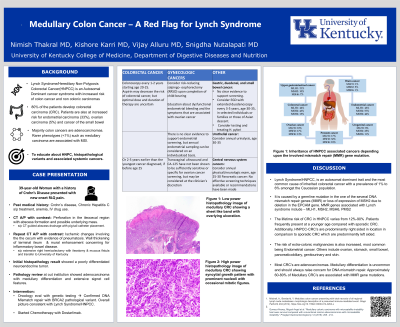Sunday Poster Session
Category: Colon
P0325 - Medullary Colorectal Cancer – A Red Flag for Lynch Syndrome
Sunday, October 22, 2023
3:30 PM - 7:00 PM PT
Location: Exhibit Hall

Has Audio
- NT
Nimish Thakral, MD
University of Kentucky
Lexington, KY
Presenting Author(s)
Nimish Thakral, MD, Kishore Karri, MD, Vijay Aluru, MD, Snigdha Nutalpati, MD
University of Kentucky, Lexington, KY
Introduction: Lynch syndrome also known as Hereditary Non-Polyposis Colorectal Cancer (HNPCC) is an inherited cancer syndrome with increased risk of colorectal cancer. While majority of CRC are adenocarcinomas. HNPCC can also present with rarer pathological phenotypes. Here we present a rare case of HNPCC with medullary differentiation.
Case Description/Methods: A 39-year-old female with a history of Crohn’s disease, morbid obesity, hepatitis C and IV drug use presented with new onset right lower quadrant pain to an outside facility. Initial CT abdomen/pelvis with contrast showed perforation in the ileocecal region with a possible underlying mass. She subsequently underwent exploratory laparotomy with complete right hemicolectomy & ileostomy. Subsequent pathology analysis showed poorly differentiated neuroendocrine tumor. The patient was then transferred to our institute for further care.
Review of pathology samples at our institute showed adenocarcinoma with medullary differentiation and extensive signet ring cell features. Additional genetic analysis showed the presence of MLH 1 and PMS2. The diagnosis of Lynch Syndrome was thus confirmed. Given that the patient was the proband, her first-degree relatives also underwent screening. Unfortunately, the patient did not respond well to chemotherapy and succumbed due to worsening tumor burden.
Discussion: HNPCC is inherited cancer syndrome that has an amplified risk of multiple cancer at a younger age (less than 50 years) including those of the colon, endometrium, small bowel amongst others. This results from high level microsatellite instability (MSI-H) or mismatch repair deficiency. Medullary differentiation is a rare pathological subtype in CRC, with only 5-8/10,000 cases. The occurrence of MD is a hallmark of micro-satellite instability and should raise concern for HNPCC. Gastroenterologists must be aware of this co-relation as delayed diagnosis of HNPCC in patients can result in increased morbidity, not only to the patient but also to additional family that gets bereft of appropriate screening.
Disclosures:
Nimish Thakral, MD, Kishore Karri, MD, Vijay Aluru, MD, Snigdha Nutalpati, MD. P0325 - Medullary Colorectal Cancer – A Red Flag for Lynch Syndrome, ACG 2023 Annual Scientific Meeting Abstracts. Vancouver, BC, Canada: American College of Gastroenterology.
University of Kentucky, Lexington, KY
Introduction: Lynch syndrome also known as Hereditary Non-Polyposis Colorectal Cancer (HNPCC) is an inherited cancer syndrome with increased risk of colorectal cancer. While majority of CRC are adenocarcinomas. HNPCC can also present with rarer pathological phenotypes. Here we present a rare case of HNPCC with medullary differentiation.
Case Description/Methods: A 39-year-old female with a history of Crohn’s disease, morbid obesity, hepatitis C and IV drug use presented with new onset right lower quadrant pain to an outside facility. Initial CT abdomen/pelvis with contrast showed perforation in the ileocecal region with a possible underlying mass. She subsequently underwent exploratory laparotomy with complete right hemicolectomy & ileostomy. Subsequent pathology analysis showed poorly differentiated neuroendocrine tumor. The patient was then transferred to our institute for further care.
Review of pathology samples at our institute showed adenocarcinoma with medullary differentiation and extensive signet ring cell features. Additional genetic analysis showed the presence of MLH 1 and PMS2. The diagnosis of Lynch Syndrome was thus confirmed. Given that the patient was the proband, her first-degree relatives also underwent screening. Unfortunately, the patient did not respond well to chemotherapy and succumbed due to worsening tumor burden.
Discussion: HNPCC is inherited cancer syndrome that has an amplified risk of multiple cancer at a younger age (less than 50 years) including those of the colon, endometrium, small bowel amongst others. This results from high level microsatellite instability (MSI-H) or mismatch repair deficiency. Medullary differentiation is a rare pathological subtype in CRC, with only 5-8/10,000 cases. The occurrence of MD is a hallmark of micro-satellite instability and should raise concern for HNPCC. Gastroenterologists must be aware of this co-relation as delayed diagnosis of HNPCC in patients can result in increased morbidity, not only to the patient but also to additional family that gets bereft of appropriate screening.
Disclosures:
Nimish Thakral indicated no relevant financial relationships.
Kishore Karri indicated no relevant financial relationships.
Vijay Aluru indicated no relevant financial relationships.
Snigdha Nutalpati indicated no relevant financial relationships.
Nimish Thakral, MD, Kishore Karri, MD, Vijay Aluru, MD, Snigdha Nutalpati, MD. P0325 - Medullary Colorectal Cancer – A Red Flag for Lynch Syndrome, ACG 2023 Annual Scientific Meeting Abstracts. Vancouver, BC, Canada: American College of Gastroenterology.
